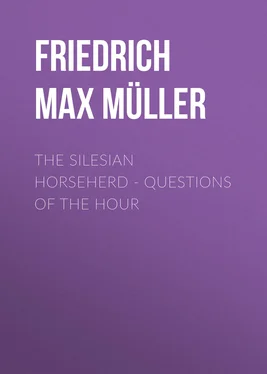Friedrich Max Müller - The Silesian Horseherd. Questions of the Hour
Здесь есть возможность читать онлайн «Friedrich Max Müller - The Silesian Horseherd. Questions of the Hour» — ознакомительный отрывок электронной книги совершенно бесплатно, а после прочтения отрывка купить полную версию. В некоторых случаях можно слушать аудио, скачать через торрент в формате fb2 и присутствует краткое содержание. Жанр: foreign_prose, foreign_religion, Философия, foreign_psychology, foreign_antique, на английском языке. Описание произведения, (предисловие) а так же отзывы посетителей доступны на портале библиотеки ЛибКат.
- Название:The Silesian Horseherd. Questions of the Hour
- Автор:
- Жанр:
- Год:неизвестен
- ISBN:нет данных
- Рейтинг книги:4 / 5. Голосов: 1
-
Избранное:Добавить в избранное
- Отзывы:
-
Ваша оценка:
- 80
- 1
- 2
- 3
- 4
- 5
The Silesian Horseherd. Questions of the Hour: краткое содержание, описание и аннотация
Предлагаем к чтению аннотацию, описание, краткое содержание или предисловие (зависит от того, что написал сам автор книги «The Silesian Horseherd. Questions of the Hour»). Если вы не нашли необходимую информацию о книге — напишите в комментариях, мы постараемся отыскать её.
The Silesian Horseherd. Questions of the Hour — читать онлайн ознакомительный отрывок
Ниже представлен текст книги, разбитый по страницам. Система сохранения места последней прочитанной страницы, позволяет с удобством читать онлайн бесплатно книгу «The Silesian Horseherd. Questions of the Hour», без необходимости каждый раз заново искать на чём Вы остановились. Поставьте закладку, и сможете в любой момент перейти на страницу, на которой закончили чтение.
Интервал:
Закладка:
Christianity is especially indebted for its rapid spread to its practical side, to the energy of its love, which was bestowed on all who were weary and heavy laden. Christ and the apostles had understood how to gather around them the poor, the sinners, the most despised members of human society. They were offered forgiveness of their sins, love, and sympathy, if they merely promised to amend and sin no more. Among these earliest followers of Christ there was scarcely a change of religion in our sense of the word. Christianity was at first much more a new life than a new religion. The first disciples were and remained Jews in the eyes of the world, and that they came from the most despised classes even Origen does not dispute. Celsus had reproached the Christians because the apostles, around whose heads even in his time a halo had begun to shine, had been men of bad character, criminals, fishermen, and tax-gatherers. Origen admits that Matthew was a tax-gatherer, James and John fishermen, probably Peter and Andrew as well; but declares that it was not known how the other apostles gained a livelihood. Even that they had been malefactors and criminals, Origen does not absolutely deny. He refers to the letter of Barnabas, in which it is stated “that Jesus chose men as his apostles who were guilty of sin more than all other evil doers.” 7 7 Contra Celsum , I, 63.
He relies upon the words of Peter, when he says, “Depart from me; for I am a sinful man, O Lord.” 8 8 Luke v. 8.
Paul, in like manner, says in his epistle to Timothy, 9 9 1 Tim. i. 15.
“This is a faithful saying, and worthy of all acceptation, that Christ Jesus came into the world to save sinners, of whom I am chief.”
But it is just in this that Origen recognises the divine power of the personality and the teaching of Christ, that by means of it men who had been deeply sunken in sins could be raised to a new life; and he declares it to be unjust that those who repented of their early sins, and had entered into a pure life, well pleasing to God, should be reproached with their previous sinfulness. In this respect he makes, indeed, no distinction between the apostles and such men as Phædon and Polemo, who were rescued from the mire of their sins through philosophy; and he recognises in the teaching of Christ a still greater force, because it had proved its saving and sanctifying power without any of the arts of learning and eloquence. What the apostles were, and what they became through the influence of the Gospel, Origen himself explains in the words of Paul, “For we also were aforetime foolish, disobedient, deceived, serving divers lusts and pleasures, living in malice and envy, and hating one another.” 10 10 Tit. iii. 3.
He attributes it as an honour to the apostles that, even if their self-accusations were extravagant, they had so openly acknowledged their sins, in order to place the saving influence of the Gospel in a clearer light. But the fact itself, that the apostles had been sinful and despised men, Origen honestly admits. We also know with what true humanity Christ himself treated the adulteress: how he challenged the Pharisees, if they themselves were free from sin, to cast the first stone at her. And who does not admire the aged Pharisees who silently withdrew, one after the other, from the oldest to the youngest, without casting a stone? Have we many such Pharisees in our time? Jesus, however, dismissed the adulteress with the compassionate words, “Sin no more.” That such a course toward sin-laden mankind by one who knew no sin, made a deep impression on the masses, is perfectly intelligible. We see a remarkable parallel in the first appearance of Buddha and his disciples in India. He, too, was reproached for inviting sinners and outcasts to him, and extending to them sympathy and aid. He, too, was called a physician, a healer of the sick; and we know what countless numbers of ailing mankind found health through him. All this can be quite understood from a human standpoint. A religion is, in its nature, not a philosophy; and no one could find fault with Christianity if it had devoted itself only to the healing of all human infirmities, and had set aside all metaphysical questions. We know how Buddha also personally declined all philosophical discussion. When one of his disciples put questions to him about metaphysical problems, the solution of which went beyond the limits of human reason, he contended that he wished to be nothing more than a physician, to heal the infirmities of mankind. Accordingly, he says to Mâlunkyaputta: “What have I said to you before? Did I say, ‘Come to me and be my disciple, that I may teach you whether the world is eternal or not; whether the world is finite or infinite; whether the life-principle is identical with the body or not, whether the perfect man lives after death or not?’ ”
Mâlunkyaputta answered, “Master, you did not say that.”
Then Buddha continued, “Did you then say, ‘I will be your disciple,’ but first answer these questions?”
“No,” said the disciple.
Thereupon Buddha said: “A man was once wounded by a poisoned arrow, and his friends called in an experienced physician. What if the wounded man had said, I shall not permit my wound to be examined until I know who wounded me, whether he be a nobleman, a Brahman, a Vaisya, or a Sûdra; what his name is; to what family he belongs; if he be large or small, or of medium size, and how the weapon with which he wounded me looked. How would it fare with such a man? Would he not certainly succumb to his wound?”
The disciple then perceives that he came to Buddha as a sick man, desiring to be healed by him as a physician, not to be instructed about matters that lie far beyond the human horizon.
Buddha has often been censured because he claimed for his religion such an exclusively practical character, and instead of philosophy preached only morality. These censures began in early times; we find them in the famous dialogues between Nagasena and Milinda, the king Menander, about 100 B.C. And yet we know how, in spite of all warnings given by the founder of Buddhism, this religion was soon entirely overgrown with metaphysics; and how, finally, metaphysics as Abbidharma found an acknowledged place in the Sacred Canon of the Buddhists.
Christianity presents a parallel case. In the beginning it sought only to call sinners to repentance. The strong, as Jesus himself said, do not require a physician, but the sick. He therefore looked upon himself as a physician, just as Buddha had done in an earlier day. He declared that he was not come to destroy the law, but to fulfil it. The truth of his teaching should be known by its fruits, and there is scarcely a trace in the Gospels of philosophical discussions, or even of attacks on the schools of Greek philosophy. But even here it was soon apparent that, for a practical reformation of conduct, a higher consecration is essential. It was admitted, as an Indian philosopher is reputed long since to have said to Socrates, that no one could understand the human element who had not first understood the divine. Men of Greek culture who felt themselves attracted by the moral principles of the little Christian congregations soon, however, wanted more. They had to defend the step which they had taken, and the Christianity which they wished to profess, or had professed, against their former friends and co-believers, and this soon produced the so-called apologies for Christianity, and expositions of the philosophical and theological views which constituted the foundation of the new teaching. A religion which was recruited only from poor sinners and tax-gatherers could scarcely have found entry into the higher circles of society, or maintained itself in lecture-rooms and palaces against the cultivated members of refined circles, if its defenders, like Buddha, had simply ignored all philosophical, especially all metaphysical, questions.
Читать дальшеИнтервал:
Закладка:
Похожие книги на «The Silesian Horseherd. Questions of the Hour»
Представляем Вашему вниманию похожие книги на «The Silesian Horseherd. Questions of the Hour» списком для выбора. Мы отобрали схожую по названию и смыслу литературу в надежде предоставить читателям больше вариантов отыскать новые, интересные, ещё непрочитанные произведения.
Обсуждение, отзывы о книге «The Silesian Horseherd. Questions of the Hour» и просто собственные мнения читателей. Оставьте ваши комментарии, напишите, что Вы думаете о произведении, его смысле или главных героях. Укажите что конкретно понравилось, а что нет, и почему Вы так считаете.












